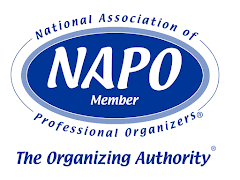Tuesday, September 16, 2014
Emergency Preparedness - Your Paper Trail
If you only had a few minutes to get out of your house for a disaster (such as a hurricane) would you be prepared for an emergency? Would you be able to grab your important papers and things you must have and be out of your house in minutes?
Do you know where all of your important papers are? Are they all in one central spot for quick and easy access in case of emergency?
Things such as:
* Drivers License (or other identification)
* Passport
* Birth Certificate
* Social Security Card
* House Insurance papers (or contact info)
* Life Insurance papers (or contact info)
* Marriage License
* Financial Info
* Money / Credit Card info
* Phone numbers for family and friends
* Medical / Health Care information
What about some of your favorite possessions? Things that you can’t replace, such as photo albums?
Since most people keep a lot of information on their computer or laptop, do you have backups and are they up to date and in a spot that you can easily access? Do you have backups that are near all of your important papers that you can grab quickly?
Do you know what you would take in an emergency? Have you ever thought about it?
I’ve never been in situation where my home had to be evacuated, though I have been in a hurricane with no place to go (a very frightening experience).
If you are evacuated from your home and your home is destroyed you will have to deal with a variety of issues, including insurance issues, where you will have to prove your identity. Can you?
In an emergency people tend to grab the strangest things. Not always the most practical things.
So think about what you would do in an emergency situation where you had to evacuate (especially if you live in high hurricane areas).
Start by thinking "what if...." and come up with a game plan. Locate all of your important papers and pick a spot where everything can be in one place and in an easy to grab container.
Prioritize your possessions and what you really need to get back on your feet.
Get yourself organized before disaster strikes. And then hope that you never have to put your plan into place.
It’s better to be prepared for a disaster than to have to go through the trauma of dealing with things that you are unprepared to handle.
Organizational Consulting Services
www.organizationalconsultingservices.com
Wednesday, September 3, 2014
Getting Ready for an Emergency - September is National Preparedness Month
It's almost the anniversary of 9/11. We should all be aware of the fact that disaster can strike anywhere. The question is "are you ready"?
Everyone should be prepared for an emergency. Whether it’s the loss of power and electricity (which could last for days) or a hurricane, earthquake or other natural disaster…. Or a terrorist attack…
Being prepared is not an “option” anymore. Even if just the electricity went out…and you happen to have an “all electric” home….would you be able to survive? Do you have enough food to last you for a few days? What happens if all the stores are closed?
These are just some things to think about….. especially if you live in a remote area and don't have quick access to a store.
There are numerous websites and articles that tell you to be prepared to survive for at least three (3) days if an emergency occurs. The “72 Hour Kit” as some people call it.
Besides the basic kit, you also need to have an emergency plan in place. Below is a basic list that will give you some ideas to get you started (there are numerous variations of this kit).
Basic Kit:
Water – one (1) gallon per person , per day for at least three (3) days
Food – 3 days supply of non-perishable food. Some ideas are: soup mix, granola bars, trail mix, crackers,
peanut butter, beef jerky, fruit cups….
Plastic / paper – plates, cups, napkins…
Radio – battery powered
Flashlight – with extra batteries
First aid kit – basic kit
Whistle
Can opener
Garbage bags & plastic bags (various sizes)
Sleeping Bag
Blankets
Clothes – for three (3) days
Shoes
Coats & hats; rain gear; cold weather gear
Personal hygiene products such as: shampoo, lotion, razors, toothbrush, toothpaste, soap, feminine
products, sunscreen…..
Wet wipes
Toilet Paper
Sewing Kit
Paper & pencils
Matches / lighter (in water proof container)
Cash
Basic tools (wrench, pliers, scissors….)
Maps
Water purification tablets (or Chlorine Bleach)
Hand Sanitizer
String / rope / cord
Cooking appliances (portable stove with fuel….)
Some things (like medications…) cannot pack ahead of time…so have a checklist prepared for those items.
Checklist for supplies that need to be packed last minute:
Prescription medication
Infant formula
Pet food
Family documents (passport, birth certificates, identification cards, bank info, insurance info….)
Watch
Games for kids
Start thinking about how you and your family would handle an emergency….and start planning for it today…before that emergency strikes.
Organizational Consulting Services
http://www.organizationalconsultingservices.com
Subscribe to:
Posts (Atom)



